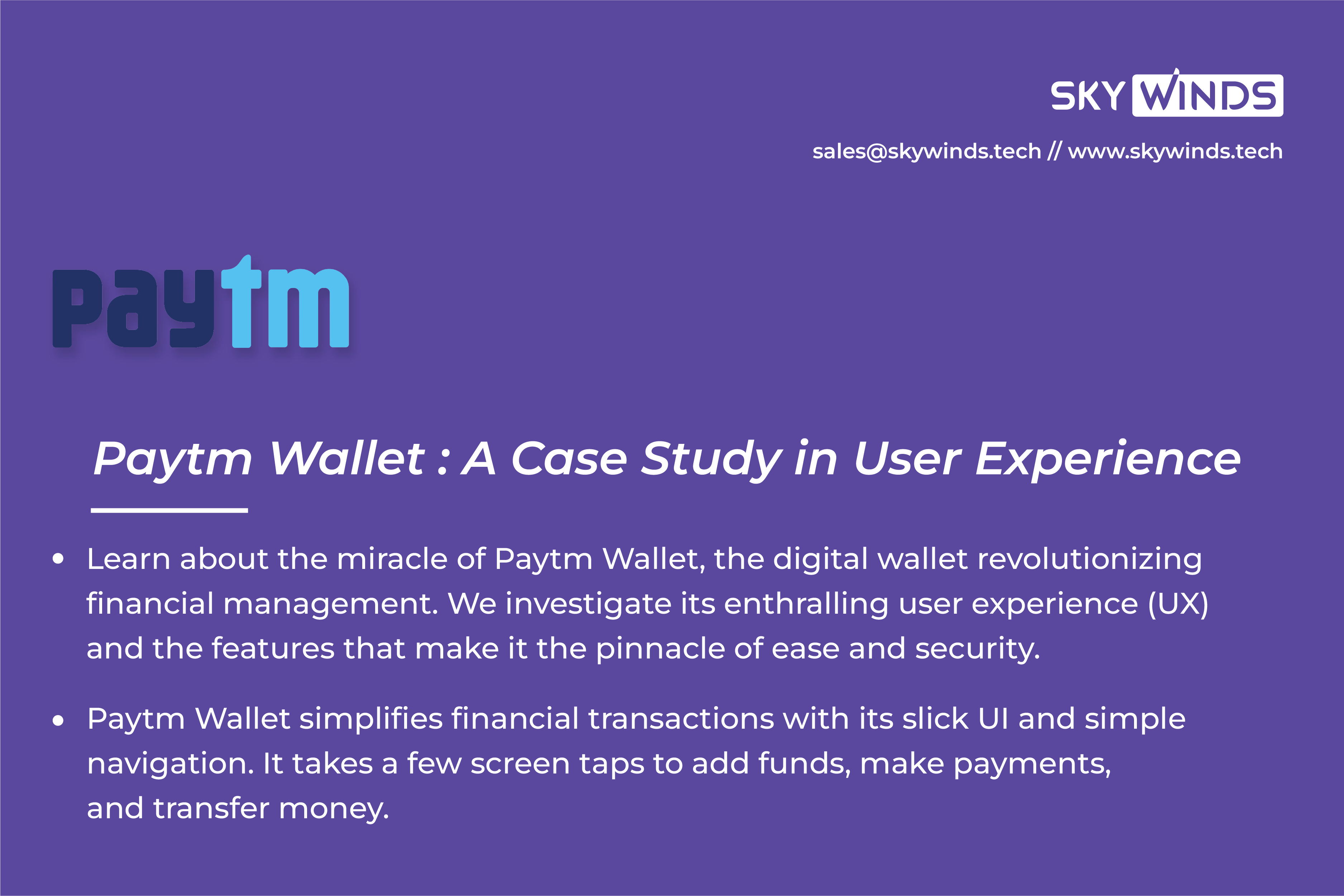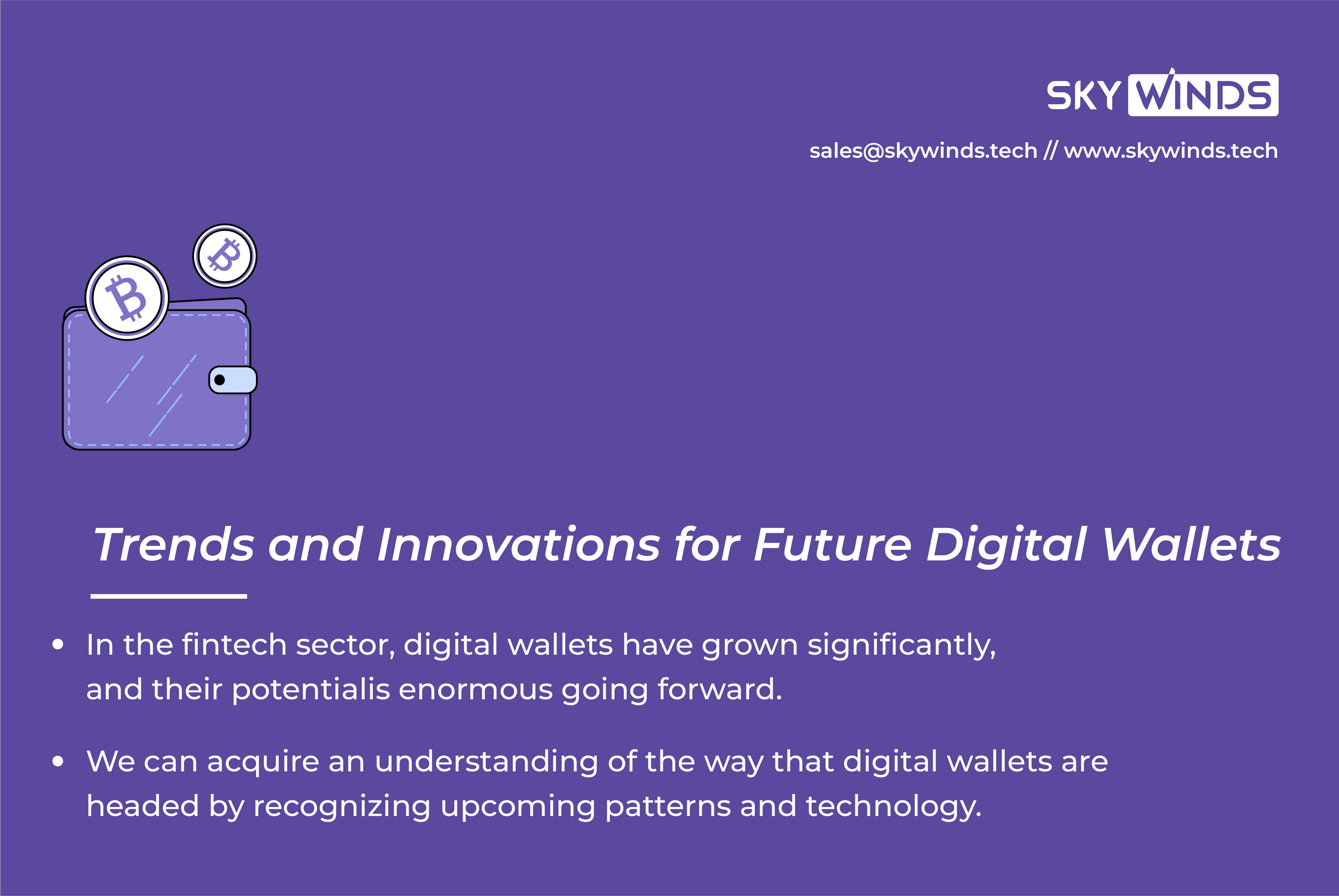
In the rapidly evolving world of finance, a remarkable secret has been quietly reshaping the industry: digital wallets. Reports suggest that the first digital wallet was launched in 1997 by Coca-Cola, making it closely associated with the first digital payment system. These unsung heroes of fintech have emerged as the catalysts propelling us into a future where transactions are seamless, secure, and utterly transformative. Welcome to a captivating journey where we uncover the untold story of how digital wallets are leading the fintech industry forward.
Embark on this adventure with Skywinds as we delve into end-to-end fintech software development, unveiling the process behind creating custom fintech apps. With a sharp focus on answering your burning questions, we’ll demystify the fintech app development process. But that’s not all.
Throughout this blog, we’ll unveil the secrets of their success, reveal their impact on financial inclusion, and explore the game-changing opportunities. It’s time to unlock the potential of digital wallets and embrace the future they hold as they revolutionize how we transact, one virtual payment at a time.
The Rise of Digital Wallets: Revolutionizing the Fintech Landscape
Traditional banking systems are facing mounting pressure to adapt to the ever-evolving needs of consumers. Enter fintech, the dynamic field of financial technology that holds the key to transforming how we handle money. At the forefront of this revolution are digital wallets, the unsung heroes revolutionizing the fintech industry.
Picture this: a virtual pocket that holds your cash, cards, and payment information securely within your smartphone. That’s the essence of a digital wallet. With the world becoming increasingly interconnected, the popularity of digital wallets has skyrocketed. According to recent Forbes statistics, 32% of mobile wallet users currently use three or more mobile wallets, including Google Pay, Apple Pay, and others. These digital powerhouses offer users a frictionless and secure way to transact, seamlessly blending convenience and peace of mind. From person-to-person transfers to online purchases, digital wallets have become a tool for the modern consumer.
The Alchemy of Digital Wallet Integration and Fintech Companies
Fintech firms are alchemists, transforming the mundane into riches. They have capitalized on the revolutionary power of digital wallets by effortlessly incorporating them into their product offerings. Fintech companies are producing creative solutions that transform the way users engage with financial institutions by incorporating cutting-edge technologies. Traditional limits no longer bind banking, investment, and remittances. Digital wallets serve as a link between users and a world of financial possibilities. As of September 2022, 358 banks participated in India’s Unified Payments Interface (UPI), which logged 6.8 billion transactions totaling more than $135 billion.
The Advantages of Digital Wallets for Users and Businesses
The attractiveness of digital wallets stems from their numerous advantages for individuals and businesses.
- Say goodbye to handling several credit cards and remembering intricate account information. Users benefit from unrivaled convenience from these digital companions, which enable quick and secure transactions with a single touch.
- Payment is simplified and expedited with digital wallets, making ordinary transactions a snap.
- Users may be certain that their financial information is safe from cyber threats thanks to sophisticated encryption and authentication procedures in place.
Businesses, too, benefit from using digital wallets.
- Businesses that accept these future payment options can reach new client segments by recruiting tech-savvy individuals who want frictionless cashless transactions.
- Aside from user acquisition, digital wallets improve operational efficiency by lowering dependency on time-consuming cash and check processing. The future of commerce is cashless, and firms that embrace digital wallets will thrive.
End-to-End Fintech Software Development with Digital Wallets
Embarking on the journey of fintech app development requires a meticulous and well-structured process.
- It begins with comprehensive research and analysis to gain insights into user needs and market trends, laying the foundation for designing an intuitive user interface (UI) and crafting a seamless user experience (UX).
- Collaborative efforts among designers, developers, and stakeholders ensure the app’s vision aligns with the target audience.
- Next comes the crucial stage, the development phase begins. Leveraging the power of Flutter and Dart 3, developers start coding the app, implementing functionalities, integrating APIs, and optimizing performance.
The Power of Flutter and Dart 3 in Custom Fintech App Development
For custom fintech app development, the winning combination of Flutter and Dart 3 proves invaluable. Flutter, an open-source UI toolkit by Google, empowers developers to build visually stunning and high-performance apps for multiple platforms using a single codebase. Its widget-based architecture facilitates rapid development, enabling the creation of custom UI elements and smooth handling of complex animations.
Dart 3, the programming language used in Flutter, offers several advantages. With its just-in-time (JIT) compilation and hot-reload feature, developers can instantly see the results of code changes, speeding up the development process and fostering a highly iterative workflow. Dart’s strong typing and modern syntax contribute to writing clean, efficient, and maintainable code.
The synergy between Flutter and Dart 3 empowers developers to create feature-rich fintech apps with seamless user experiences, delightful animations, and native-like performance across different platforms.
Addressing FAQs: Key Considerations in Fintech Software Development
Navigating the realm of financial software development is fraught with questions and concerns. Addressing these FAQs is critical to ensuring a smooth and successful development journey.
- How long will the development process take, and how much will it cost?
Ans: The length of the development process varies according to criteria such as app complexity, required features, and project scope. A well-planned development timetable can usually range from a few months to a year. Program complexity, required development resources, and additional integrations determine the price. A thorough cost estimate can be offered depending on individual project needs.
- Can the software be scaled as the user base expands?
Ans: Yes, scalability is an important factor in financial app development. The app’s scalable architecture and powerful backend infrastructure allow it to accommodate increasing users, transactions, and data volumes without sacrificing performance. Scalability is built throughout the development process to ensure that the app can grow in tandem with the user base and changing market needs.
- Is adding new features or modifying them after launching the app feasible?
Ans: Yes, with an agile development methodology, adding new features or making adjustments to the app after launch is possible. Agile approaches, such as Scrum or Kanban, offer iterative development cycles, allowing for continual improvement and incorporation of user feedback. This adaptability ensures that the software remains adaptive to shifting market demands and user expectations.
Paytm Wallet: A Case Study in User Experience

Learn about the miracle of Paytm Wallet, the digital wallet revolutionizing financial management. We investigate its enthralling user experience (UX) and the features that make it the pinnacle of ease and security.
Paytm Wallet simplifies financial transactions with its slick UI and simple navigation. It takes a few screen taps to add funds, make payments, and transfer money. The wallet provides a variety of payment alternatives, including UPI, cards, and online banking, to ensure a smooth experience for all users.
What sets Paytm apart are its robust features:
- Paytm Wallet prioritizes security using industry-leading encryption and multi-factor authentication to safeguard confidential and sensitive information.
- Innovative features such as fingerprint and facial recognition provide additional assurance, fostering trust and peace of mind.
- Paytm Wallet is distinguished by its seamless integration of payment services and loyalty programs. Users can easily settle bills, recharge mobile phones, and shop online with the software.
- In addition, integrating loyalty programs rewards customers with rebates and bonuses, making financial management an enjoyable experience.
Paytm Wallet stands out as a light of innovation in the digital wallet space, constantly refining its features and broadening its frontiers.
Trends and Innovations for Future Digital Wallets
In the fintech sector, digital wallets have grown significantly, and their potential is enormous going forward. We can acquire an understanding of the way that digital wallets are headed by recognizing upcoming patterns and technology.

- Blockchain technology being incorporated into digital wallets is one important trend. Transactions are safer, and the danger of fraud is lower thanks to blockchain’s increased security, transparency, and immutability.
- Additionally, the incorporation of cryptocurrencies into digital wallets creates new opportunities for secure international transactions and decentralized financial services.
- Contactless payments are becoming increasingly common, which is another new trend. Users no longer need physical cards or cash to make purchases; instead, they may tap their smartphones or wearables to make a payment, using near-field communication (NFC) technology and mobile wallets. In a post-pandemic environment, this contactless payment mechanism is gaining popularity since it is quick, easy, and hygienic.
- In addition, digital wallets now feature a wider range of services in addition to financial transactions. Digital wallets are consequently being utilized more frequently for numerous daily chores, such as maintaining loyalty programs and purchasing tickets. The variety of offerings enhances the user experience generally and promotes adoption.
With the changing financial landscape, digital wallets are poised to be a key factor in shaping the future of finance.
Conclusion
Digital wallets in Fintech have far surpassed expectations, emerging as the catalyst for industry transformation. With their unparalleled blend of convenience, security, and innovation, they spearhead the journey toward a cashless future. From contactless payments to seamless transactions, digital wallets have revolutionized financial management, reinventing how we navigate our monetary realm. So, embrace the possibilities, become part of the revolution by incorporating with a fintech app development company, and witness firsthand how digital wallets rewrite the rules of the fintech landscape.

